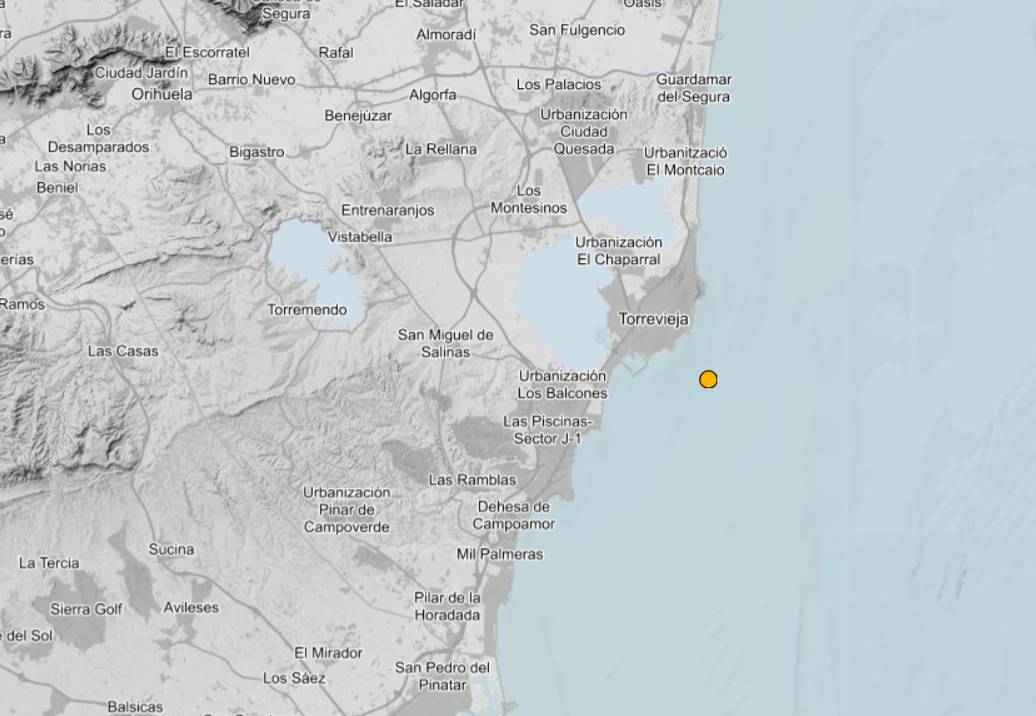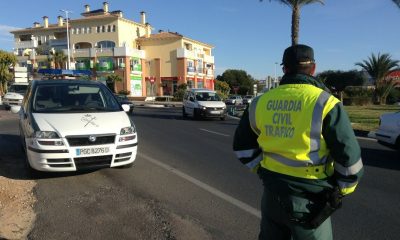Costa Blanca
Torrevieja records a 2.8 magnitude earthquake

This morning at 12:23 a.m. , Tuesday, April 15, a magnitude 2.8 earthquake struck with its epicenter southeast of Torrevieja, which was felt widely throughout the population. The quake struck at a depth of only 2 kilometers, “which made it more noticeable.”
The 1829 Torrevieja earthquake was a significant seismic event that occurred on March 21st, 1829. It had an estimated magnitude of 6.6 Mw .
Key points about the earthquake:
- Devastation: The earthquake caused widespread destruction in Torrevieja and several surrounding towns. Almoradí was particularly affected, suffering the most casualties. Guardamar del Segura had to be almost entirely redesigned due to the damage.
- Casualties and Damage: Tragically, around 389 people lost their lives, and 377 were injured. Approximately 2,965 houses were completely destroyed, and another 2,396 were damaged. Bridges over the Segura River in Almoradí, Benejúzar, Dolores, and Guardamar also collapsed.
- Seismic Activity: The decade leading up to the earthquake (1820-1830) was a period of heightened seismic activity in the region. In the months preceding the major event, over 200 tremors were recorded.
- Aftermath and Remembrance: The earthquake had a profound impact on the collective memory of the Vega Baja region. Even today, towns like Almoradí and Torrevieja commemorate the event and the victims. San Emigdio, the patron saint of earthquakes, is often invoked for protection.
- Geological Context: The earthquake occurred in a seismically active area influenced by the Bajo Segura fault system, which includes the Benejúzar-Benijófar, Guardamar del Segura, and Torrevieja faults. The Alicante coast experienced a significant sinking, estimated at about 10 meters, along the Torrevieja fault.
- Building Practices: The earthquake highlighted the vulnerability of the existing construction methods, with many houses built with weak wooden beams collapsing. This event led to a greater emphasis on earthquake-resistant building techniques in the region.
While Torrevieja has experienced minor earthquakes since then, the 1829 event remains the most devastating recorded in the area, serving as a reminder of the region’s seismic history.
Discover more from Costa Blanca Daily
Subscribe to get the latest posts sent to your email.
Costa Blanca
What happens if you overtake the Guardia Civil on the road?

It is highly probable that you have encountered a Guardia Civil vehicle at some point and have contemplated whether or not to overtake it. The DGT’s recommendation and the consequences of doing so are as follows.
It is crucial to have a clear understanding of how to respond to the authorities. Therefore, what are the consequences if you overtake the Guardia Civil on the road? Well, the Directorate General of Traffic has a clue.
It is probable that you encountered a Guardia Civil vehicle while travelling. At that moment, you are uncertain as to whether you will be able to succeed. There is no need for concern, as this type of situation is a relatively common occurrence.
It is a relatively prevalent occurrence in rural areas, where the Guardia Civil is more prevalent, on secondary roads.
There are numerous drivers who are apprehensive about passing a Guardia Civil vehicle. Nevertheless, there is no regulation prohibiting the overtaking of official vehicles. This includes not only vehicles belonging to theGuardia Civil, but also those belonging to the National Police and the Army.
The initial response is affirmative. As we have previously noted, the General Traffic Regulations do not prohibit overtaking the Guardia Civil at any time. Passing these vehicles is not detrimental. This is true only if you adhere to the traffic regulations.
In reality, it is a prevalent practice among numerous motorists to abruptly decelerate when they observe a Guardia Civil vehicle, which can be hazardous to the vehicles in their rearview mirrors. That can result in a fine.
In the same vein, if you exhibit unusual behaviour while driving that could impede traffic or arouse suspicions among officers, they may halt you to determine whether there is a problem or if everything is in order.
Nevertheless, it is imperative to consider the law when overtaking any vehicle, not just a Guardia Civil vehicle. Drivers are required to respect the maximum speed limit of the road they are on: On motorways and dual carriageways, the speed limit is 120 km/h, while on secondary highways, it is 90 km/h.
Consequently, if you attempt to outpace a Guardia Civil vehicle travelling at 90 km/h on the highway, you will be subject to a fine. However, the same principle applies when a radar or Pegasus helicopter detects a vehicle surpassing another. There is no issue if the vehicle is travelling at a reduced speed.
The DGT’s hint
According to the DGT, “overtaking is the act of passing another moving vehicle, which is travelling at a slower speed, in front of the vehicle you are operating.” Generally, you should overtake on the left side of the vehicle you intend to overtake.
Overtaking is a complex manoeuvre that entails a moderate level of risk, particularly on secondary roads, as it necessitates the temporary occupation of the opposite lane.
Consequently, overtaking is only permissible at designated locations when traffic signs authorise it. The DGT suggests that the safety rule “rearview mirror – signal – manoeuvre” be implemented in this context, with the awareness that quicker vehicles may be approaching from behind.
It is crucial to bear in mind that the Traffic Department has eradicated the additional 20 km/h margin for overtaking on conventional roads since the end of 2021. Consequently, the utmost permissible speed is 90 km/h, and it is prohibited to exceed it to overtake another vehicle.
Discover more from Costa Blanca Daily
Subscribe to get the latest posts sent to your email.
Costa Blanca
Alicante-Elche Airport records nearly 1.5 million passengers in March

In March, Alicante-Elche Miguel Hernández Airport registered 1,475,739 passengers, marking a 16.4% increase from the same month in 2024. The increase marks the third consecutive record month for the airport. It is important to note that Easter 2024 occurred in March, as opposed to April of this year.
The Elche airport’s international market remains the dominant force, with an 18.2% increase in March to 1,274,566 registered passengers. The domestic traffic recorded 199,917 passengers, representing a 6% increase. This is in comparison to the same period last year and to commercial traffic.
In March, the United Kingdom was the leading international market, with 502,586 passengers. The Netherlands, Germany, Poland, and Belgium followed, with 97,869, 95,729, 88,584, and 81,616 passengers, respectively.
The airport also set a monthly record in March, with a total of 9,396 operations, a 19.1% increase from the same month in 2024. This data pertains to flights.
Alicante-Elche Miguel Hernández Airport recorded a total of 3,699,742 passengers during the first quarter of the year, which is a 14.6% increase from the same period last year. These same months saw a total of 24,094 movements, a 16.2% increase over 2024. This data pertains to flights.
Discover more from Costa Blanca Daily
Subscribe to get the latest posts sent to your email.
Costa Blanca
Elderly man held captive by couple who scammed him out of 85,000€

National Police officers have freed an elderly man in Alicante. The elderly individual was allegedly held by a couple who were accused of defrauding over 85,000 euros.
Furthermore, it is purported that the individuals who were apprehended forced him into altering his will and conducted bank transfers to third parties in Colombia, concealing the intended recipient of the funds. The victim was able to flee while her captures were asleep. According to the police headquarters, he requested assistance from a neighbour, who then informed the police officers.
In May 2024, the victim encountered a woman at the hospital who suggested that she care for him after learning that he had no family or close acquaintances. This was the beginning of the story. A few days later, she and her husband moved in with her under the pretence of helping him and preventing others from entering the house.
They were attentive and kind for weeks, taking him for walks and establishing his trust. However, they soon enquired about their bank accounts, confidential passwords, potential heirs, and their heritage.
The agreement underwent modifications as the months progressed. The couple persuaded the victim to travel to Colombia, promising to purchase a property in his name. They processed a variety of documents in Colombia, but they never bought him about any property.
During the journey, he endured degrading treatment and humiliation, which worsened his condition and increased his distress. In Spain, his isolation was further exacerbated by the alleged confiscation of the keys to his own home in order to prevent him from leaving, as well as the stopping of his bank visits and the monitoring of his movements.
Taking advantage of the couple’s slumber, the elderly man was able to escape and request assistance from a neighbour, whom he promptly contacted at 091. A patrol that arrived at the scene discovered the victim in a state of anxiety and nervousness. The agents subsequently located and apprehended the alleged perpetrators in the vicinity of the residence after gathering their testimony and verifying the situation.
The Provincial Brigade of the Alicante Judicial Police conducted a subsequent investigation, which disclosed the full extent of the deception. The couple allegedly altered the elderly man’s will in their favour and transferred a total of 85,233.42 euros to bank accounts in Colombia. They made these transfers in the names of third parties to hinder their tracking.
Additionally, the woman registered two motorcycles in her name after acquiring them with a portion of the funds. It is believed that the accused’s son regularly used these vehicles, despite none of the detainees having the authority to operate them. The victim possessed only 270 euros in his bank accounts at the time of the police intervention.
The couple, a 43-year-old male and 53-year-old woman, were apprehended for the offences of fraud and illegal detention. The Alicante investigating court subsequently placed them in custody.
Discover more from Costa Blanca Daily
Subscribe to get the latest posts sent to your email.
-

 Costa Blanca2 weeks ago
Costa Blanca2 weeks agoBefore Easter, the new road through La Hoya should open
-

 News2 weeks ago
News2 weeks agoTwo firefighters dead and 15 injured in a garage fire in Alcorcón
-

 Costa Blanca1 week ago
Costa Blanca1 week agoThis week the DGT will issue over 64,000 speeding tickets
-

 Costa Blanca1 week ago
Costa Blanca1 week agoSix arrested for the use of AI to defraud over 19 million euros
-

 Costa Blanca2 weeks ago
Costa Blanca2 weeks agoThis weekend Alicante will be visited by three NATO ships
-

 Costa Blanca2 weeks ago
Costa Blanca2 weeks agoWhat is the reason for the disappearance of Chinese bazaars in Spain?
-

 Costa Blanca1 week ago
Costa Blanca1 week agoFire in Benidorm sees two being treated for smoke inhalation
-

 Costa Blanca1 week ago
Costa Blanca1 week agoBeware if you receive an orange envelope in your postbox

















